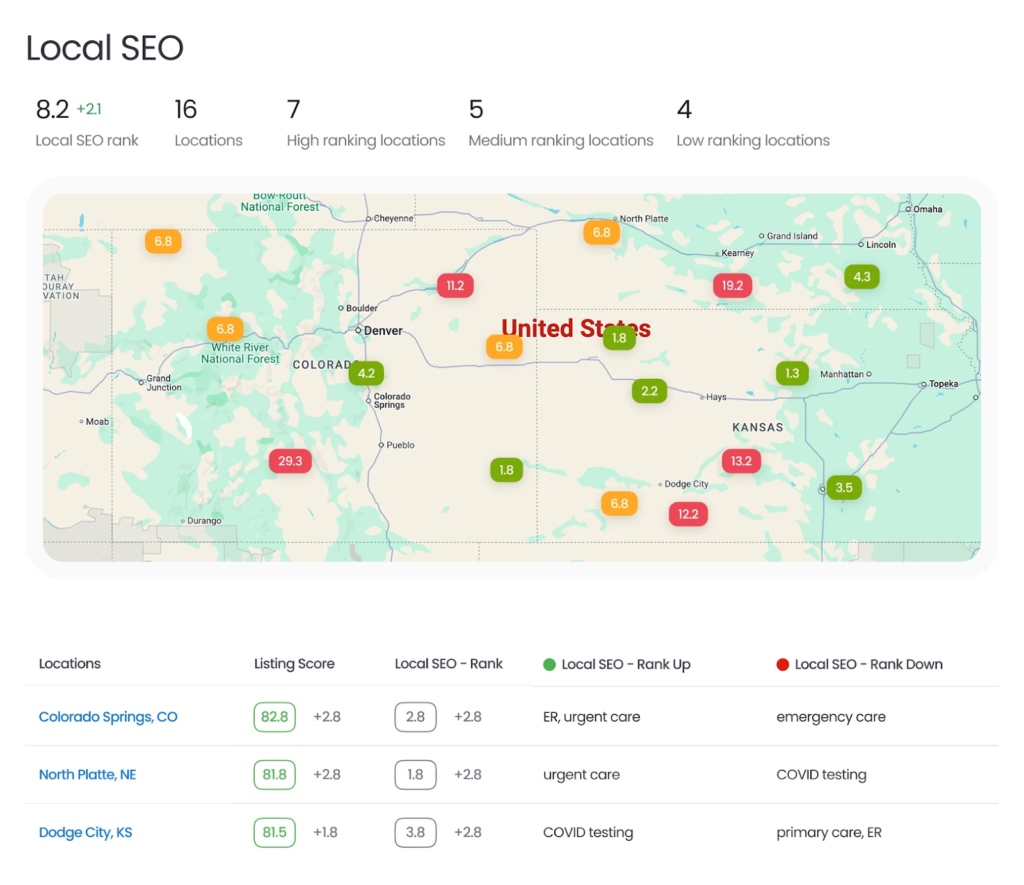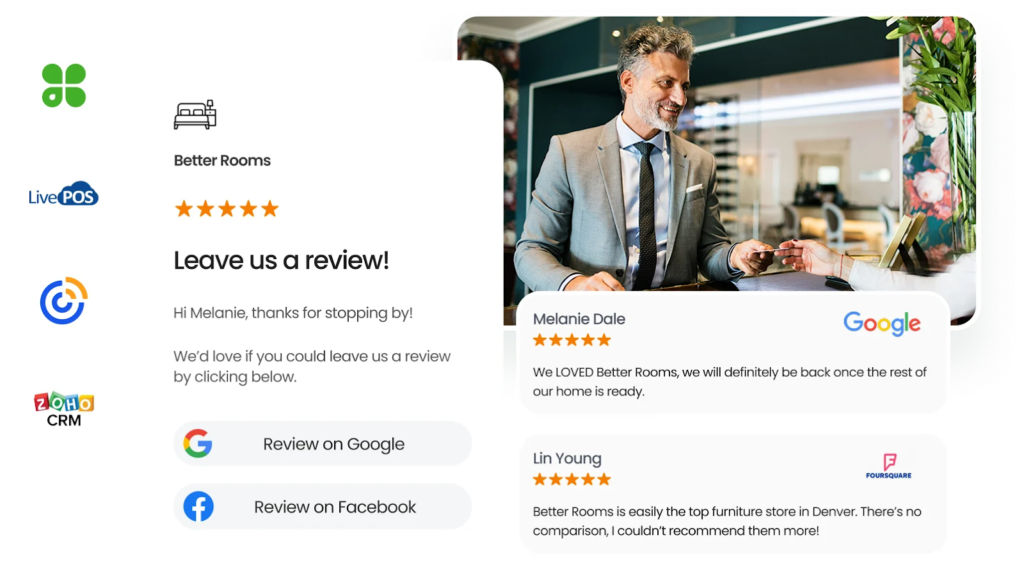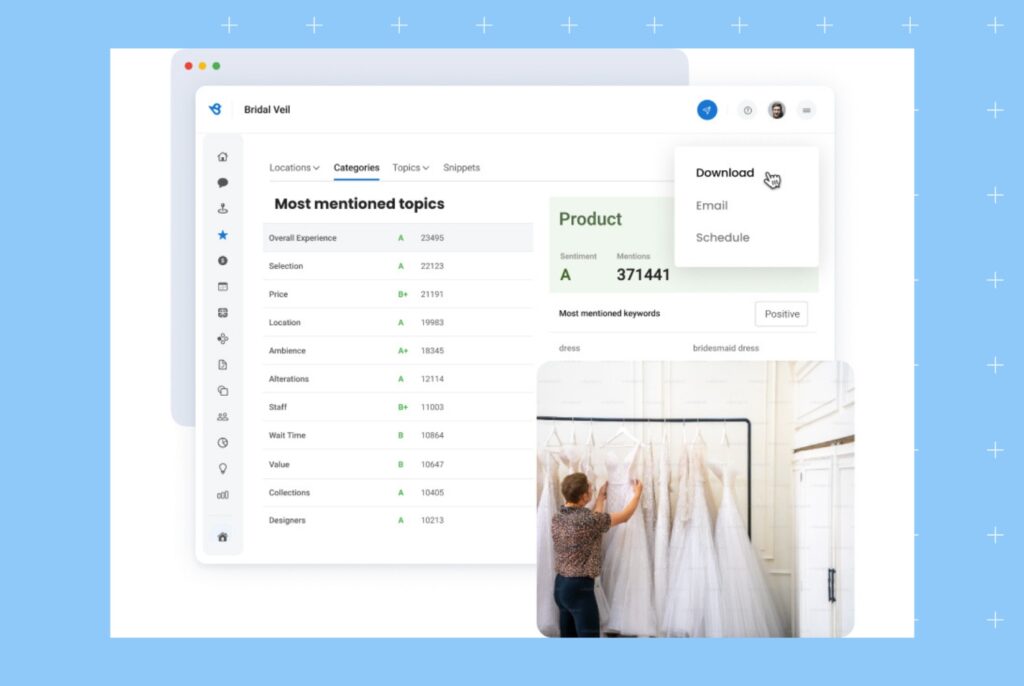Retail reputation management is no longer optional; it’s a business essential. A single negative review can impact how customers perceive your brand, affecting sales and loyalty across all channels. In fact, 72% of customers read reviews before making a purchase decision, meaning your reputation can directly shape your bottom line.
Summary
Unlike other industries where reputation often hinges on corporate image or policies, retail reputation management focuses on the customer experience, product quality, availability, and service consistency. These elements together define how shoppers talk about your brand online and offline.
In this blog, we will share five actionable strategies to strengthen your retail review management and retail reputation management in 2026 and ensure your brand earns trust, visibility, and customer loyalty.
Table of contents
- What is reputation management for retail?
- 5 reputation management strategies for retail companies
- Why does reputation management in retail matter?
- What are the consequences of a negative reputation?
- What are the benefits of a positive online reputation?
- What are the phases of reputation management in retail?
- How does AI help in retail reputation management?
- Are there any tools to automate reputation management retail?
- Frequently asked questions about retail reputation management
- How Birdeye makes retail reputation management effortless in 2026
What is reputation management for retail?
Retail reputation management means actively performing online reputation management tasks for your retail business. You must actively take steps to influence what people online see, think, and experience when communicating with your brand.
Various studies have shown that consumers’ exposure to online reviews will influence their online retail shopping behavior. Many brands rely on a retail reputation management company or use retail reputation management software to monitor reviews, analyze customer sentiment, and automate responses.
Want to understand the influence of online reviews on retail businesses? Download our Impact of online reviews on multi-location businesses guide.

What is a good reputation management strategy?
Good retail reputation management involves:
- Responding to negative comments or reviews
- Setting the record straight whenever information is incorrect or misleading
- Regular review management — monitoring what people say online about your brand
Retail reputation management also requires:
- Proactively looking for opportunities to expand reach
- Improving online image instead of simply waiting for customer feedback or complaints
If you are looking to streamline these efforts, using a retail reputation management software solution can automate monitoring and reporting while ensuring consistent brand messaging across locations.
Not sure where to get started? Below, we have outlined the top 5 strategies for successful reputation management for retail companies.
5 reputation management strategies for retail companies
From managing listings to responding to reviews and gathering feedback, here are five practical strategies to strengthen your retail reputation management in 2025.
1. Update your business listings on all platforms
You want to be accessible to your customers. Failure to be accessible when they need you could result in the customer looking elsewhere to purchase a similar product.
Birdeye’s AI-powered business listing management makes it easy to create, update, and manage business listings for all locations. This helps your business show up where your customers search, even when it’s on customer review sites.
Being accessible to your customers involves creating, claiming, and regularly updating your local business listings to give customers accurate information to get in touch and finalize a sale.

Keep in mind that having an active presence on listing sites isn’t enough. You must ensure you are consistent across all platforms. Your name, address, contact information, and other details must be the same everywhere they appear. If they aren’t, your target audience will be confused, and they may doubt your credibility.
Taking the time to follow these steps will save you time and stress in the long run, and allow your business to work efficiently across all platforms, including your Google business profile, social media profiles, and other online listings.
2. Respond, manage, and market your reviews smartly
The retail review management strategy requires you to take the first step and ask for reviews before your customers exit the customer journey so that you can collect and analyze the reviews in real time.
Read our guide to responding to reviews to show you’re serious about delighting every customer.
Getting reviews is the first step. Once you have the reviews, you want to train your staff well to respond to both good and bad reviews and act as quickly as possible to address negative feedback.
Remember that over half of customers expect businesses to respond to negative reviews within a week, and one-third expect a reply within three days or less.

3. Supercharge your ad performance with Google Seller Ratings
Google Seller Ratings is another reputation management retail tool that can catapult your online reputation by offering increased customer conversion, increased advert quality score, and lower cost per click on your business adverts.
For those who don’t know, Google Seller Ratings is an ad extension that allows you to display your customer reviews directly to your Google ads. This boosts your credibility and helps you maximize the return on your ads.
4. Get the best word-of-mouth marketing with referrals
Word-of-mouth marketing remains a crucial marketing strategy, even in our increasingly digital world. In fact, Birdeye data shows that friends and family are the main resource people use when searching for a business. The more people talk about your business within their inner circles, the more likely your business will organically grow through word-of-mouth referrals.
This can be a lot to keep track of manually, but fortunately, with Birdeye, your business can track and multiply your referrals with ease.
5. Turn customer feedback into actionable to-dos
A retail reputation management tactic that is often overlooked is actively turning customer feedback into actionable insights.

There are two main ways of achieving this: directly and indirectly.
- The direct approach is when the customers share their experiences and comments with you via support channels, surveys, online polls, and any other medium where you’ve directly requested it.
- The indirect approach is when customers share their feedback elsewhere, and it’s your job to locate that feedback and action it as necessary.
Implement These Retail Reputation Management Tips to Stay Ahead, Online & Offline
Want to see the impact of Birdeye on your business? Watch the Free Demo Now.
Why does reputation management in retail matter?
Retail reputation management matters because the stronger your reputation, the more likely the customer will purchase your product. Below, we’ll explore three more reasons why reputation management in retail is crucial.
#1. Shows the brand’s resilience
Reputation management enhances a brand’s resilience during challenges. During the COVID-19 pandemic, Target’s proactive safety measures and transparent communication helped it maintain a positive reputation and customer trust.
#2. Influences the supply chain
A strong reputation can influence supply chain relationships. For example, Walmart’s commitment to sustainable sourcing boosted its reputation and attracted eco-conscious suppliers, ensuring a consistent supply of eco-friendly products.
Did you know? Pricing is crucial in retail reputation management as it directly impacts customer perception, satisfaction, and trust, ultimately shaping the business's reputation.
#3. Aids global expansion
Reputation management facilitates global expansion. For example, Amazon’s consistent focus on customer satisfaction and quick problem resolution has played a pivotal role in its global success, as it ventured into new markets while maintaining a solid reputation.
These examples demonstrate how reputation management can profoundly impact a retail brand’s success and growth.

What are the consequences of a negative reputation?
A negative reputation can do significant damage to your business’s profitability. A single negative review can deter prospects, particularly if that one review is left unaddressed or unremedied.
Here are some potential repercussions:
1. Loss of trust
A negative reputation erodes trust, whether it’s a person, brand, or institution. People are less likely to believe or engage with those they perceive negatively.
2. Reduced credibility
A poor reputation diminishes credibility, making it hard to win the hearts of their target customers. Rebuilding a damaged reputation is often lengthy and resource-intensive, and some entities may never fully recover.
3. Decline in sales or support
Businesses often experience a drop in sales or financial support when their reputation takes a hit. Consumers are more inclined to choose brands they trust.
4. Strained relationships
Negative reputations can strain customer, partner, employee, and stakeholder relationships, impacting collaboration and cooperation.
5. Legal and regulatory consequences
In some cases, a tarnished reputation can lead to legal issues or regulatory actions, affecting an entity’s operations and finances.
6. Employee morale and recruitment challenges
Negative reputations can demoralize existing employees and make it difficult to attract top talent, as potential hires may be wary of associating with a poorly regarded organization.
Ultimately, a negative reputation can result in financial losses, impacting revenue, stock prices, and overall financial stability.
Building that trust and dependability doesn’t mean being happy about negative reviews or feedback, but it does mean quickly and professionally addressing those reviews.

What are the benefits of a positive online reputation?
Maintaining a strong online reputation will help your business avoid the above scenario and ensure you enjoy a lasting relationship with your customers. A few benefits include:
- Enhanced trust
- Attracts customers
- Improved search visibility
- Business opportunities
- Employee satisfaction
A strong retail reputation requires you to ensure you are accessible to your customers; your website is user-friendly, your social media is active and responds timely to direct messages and comments, and so on.
What are the phases of reputation management in retail?
While there is no one-size-fits-all way to manage your reputation, in general, the process can be broken down into three phases.
The first phase is monitoring and assessment.
This involves keeping a close eye on the online and offline conversations surrounding your retail brand, gathering data and feedback from various sources, and analyzing the current state of the reputation. It involves identifying potential threats, areas of concern, and opportunities for improvement. This phase lays the foundation for developing an effective retail reputation management strategy.
The second phase is strategy development and implementation.
Based on the insights gathered during the monitoring and assessment phase, a comprehensive strategy is developed to address any reputation concerns, mitigate risks, and enhance the positive perception of the retail brand. This may involve crafting compelling narratives, engaging with stakeholders, leveraging various communication channels, and executing targeted campaigns. Consistency and authenticity are crucial in this phase to build trust and credibility.
The third phase is ongoing management and adaptation.
Reputation management in retail is an ongoing process that requires continuous monitoring, evaluation, and adjustment. As customer expectations evolve, new challenges may emerge, or new opportunities may present themselves. This phase involves consistently tracking the effectiveness of the implemented strategies, making necessary adjustments, and adapting to changing circumstances. Regular communication, transparency, and responsiveness are essential to maintain a positive retail reputation over time.
How does AI help in retail reputation management?
AI helps in retail reputation management in the following key ways:
- Gain insights and monitor developments in market trends
- Monitoring of key channels
- Control misleading and inaccurate information
- Reduce operational costs
- Personalized and tailored marketing activities
Are there any tools to automate reputation management retail?
The short answer is yes.
Implementing reputation management for retail stores can seem daunting. Fortunately, Birdeye’s professional team and world-class software can help you get more done in less time.
With Birdeye’s reputation and review management software, you’ll see the following results:
- Ranking higher on SEO results.
- Automated reviews that are easily manageable and reviewable in real-time.
- Automated replies to reviews and queries.
- Monitoring reviews on over 200 sites, with the ability to turn reviews into social media content.
Similarly, with Birdeye’s state-of-the-art social media management software, businesses can readily achieve the following:
- Create automated social media posts within minutes that are tailored to your customers.
- Publish across a range of social media entities, including Facebook, Instagram, YouTube, X (formerly known as Twitter), and Google.
- Schedule posts and keep track of them through an intuitive calendar.
- Track your posts’ performance metrics, including reach and engagement.

Frequently asked questions about retail reputation management
Reputation management retail is done by developing a retail reputation management strategy, which involves ensuring your profiles are up-to-date and consistent and that you regularly and promptly respond to feedback.
A good reputation management strategy involves updating your business listings, supercharging your ad performance with Google Seller Ratings, utilizing word-of-mouth marketing, and turning customer feedback into actions.
The best practice for responding to negative reviews is to respond promptly, dispel any incorrect or misleading information, and remedy the purchaser’s concern.
After using Birdeye’s retail reputation management platform, Solomons Flooring MacGregor got 111 new reviews and improved their CX. Within 12 months of using Birdeye’s Review, they generated 111 new reviews, clocked a 175% increase in calls to the business and a 103% increase in website visitors.
Metrics in reputation like review volume, average star rating, response rate, and sentiment score directly impact customer trust, visibility, and ultimately, sales performance.
Multi-location retailers keep responses consistent by using AI-driven tools that generate on-brand replies, ensuring each location maintains the same tone and messaging.
Retail stores should reply to reviews within 24–48 hours, as timely responses demonstrate attentiveness and help strengthen customer relationships.
Enterprises should structure reputation operations with centralized oversight and AI-guided local response capabilities to balance brand consistency and location-specific engagement.
How Birdeye makes retail reputation management effortless in 2026
Retail reputation management in 2026 goes beyond review monitoring; it’s about earning trust, maintaining brand consistency, and ensuring visibility across every customer touchpoint. For large retail enterprises managing hundreds or thousands of locations, this demands automation, accuracy, and scalability, all of which Birdeye delivers.
Trusted by over 200,000 businesses and rated 4.8/5 on G2 with 3500+ verified reviews, Birdeye is the leading enterprise reputation and customer experience platform. It integrates with 3,000+ CRMs, POS systems, and marketing tools, allowing retailers to collect feedback, respond intelligently, and ensure consistent brand experiences.
From a single dashboard, retail teams can manage listings across 200+ sites, track sentiment, and access AI-powered insights to guide operational and strategic decisions.
Here’s where Birdeye makes the difference:
- Review generation agent identifies the best time and channel, such as SMS, email, or POS trigger, to request feedback after purchase. It personalizes every message using your brand voice and helps you collect authentic, location-specific reviews at scale.
- Listings AI Agents keeps store details such as hours, addresses, and promotions accurate across hundreds of review and listing platforms. This boosts search visibility and builds customer confidence before they even visit.
- Insights AI analyzes thousands of reviews and surveys to surface themes such as staff helpfulness, checkout experience, and product quality, providing regional and corporate teams with clear direction for improvement.
- Competitors AI benchmarks your brand’s reviews, sentiment, and engagement rates against nearby or category-level competitors, helping decision-makers stay informed and proactive.
- Search AI enhances your brand’s visibility in AI-driven discovery platforms such as ChatGPT, Gemini, and Perplexity by detecting missing citations or inaccurate data and generating prioritized recommendations for correction.
- Birdeye Messaging automations agent responds instantly to customer inquiries across Google, Facebook, SMS, and webchat, routing messages by topic such as returns, product availability, or service feedback to ensure that no comment is missed.
Together, these AI agents form a closed feedback system that continuously collects reviews, analyzes insights, and automates responses to improve brand reputation at every level of your organization.
With deep integrations, enterprise governance controls, and multi-location support, Birdeye in 2025 is the most complete enterprise-scale reputation management platform for retail.
To learn more about how Birdeye’s all-in-one platform can help propel your retail reputation management strategy, click the link below.

Originally published









